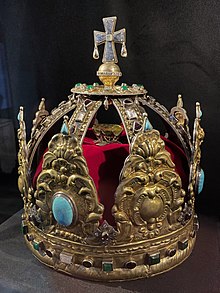Georgian art (Georgian: ქართული ხელოვნება) grew along with the development of the Georgian statehood, starting from the ancient kingdoms of Colchis and Iberia and flourishing in the Middle Ages during the Kingdom of Georgia. Because of Georgia's location at the intersection of continents and numerous civilizations, over the centuries the country attracted travelers, merchants, missionaries and conquerors of all kinds and creeds, all of which left marks on the country's cultural and artistic environment throughout its history. Georgian art tradition has thus experienced influences from Mesopotamian, Anatolian, Greek, Persian, Roman and Byzantine art throughout antiquity.[1] It has further grown within the framework of Christian ecclesiastical and middle-eastern art of the Middle Ages, and ultimately it has evolved in the context of European and Russian art from the 19th century onward.

Georgian art blossomed further during the perestroika movement in the 1980s.[2]
Notable Georgian artists
edit- Levan Songulashvili
- David Alexidze
- Elene Akhvlediani
- Gia Bugadze
- Gigo Gabashvili
- Irakli Gamrekeli
- Lado Gudiashvili
- Gia Gugushvili
- Levan Lagidze
- David Kakabadze
- Shalva Kikodze
- Sergo Kobuladze
- Mamuka Japharidze
- Ucha Japaridze
- Temo Javakhi
- Irakli Parjiani
- Niko Pirosmani
- Dimitri Shevardnadze
- Valerian Sidamon-Eristavi
- Oleg Timchenko
- Zurab Tsereteli
- Avto Varazi
- Alexander Mrevlishvili
See also
editReferences
edit- ^ Chikhladze, Nino (2003). "Reflections of Georgian-Iranian Cultural Interrelations in Seventeenth-Century Georgian Fine Art". Iran & the Caucasus. 7 (1/2): 183–190. ISSN 1609-8498.
- ^ Tsetskhladze, Ketevan (2022-12-28). "THE ART OF PERESTROIKA: NEW MOVEMENTS IN GEORGIAN ART OF THE 1980s". Culture Crossroads. 21: 106–116. doi:10.55877/cc.vol21.275. ISSN 2500-9974.